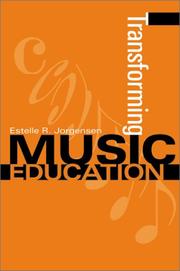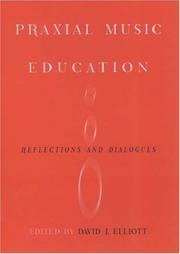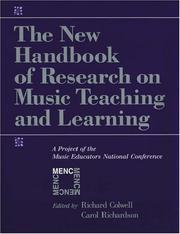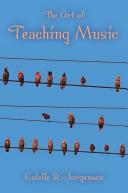| Listing 1 - 10 of 78 | << page >> |
Sort by
|
Book

ISBN: 8897160395 8890373296 Year: 2019 Publisher: Arona : Editore XY.IT,
Abstract | Keywords | Export | Availability | Bookmark
 Loading...
Loading...Choose an application
- Reference Manager
- EndNote
- RefWorks (Direct export to RefWorks)
Il gioco drammatico è un’attività espressiva, ludica, cognitiva ma è anche una corretta gestione del proprio corpo e delle sue espressioni verso gli altri e nell’ambiente. La ricerca, lo studio e la sperimentazione che da diversi anni hanno preso vita e hanno acquisito una forma attorno all’idea di arte come veicolo e come strumento di formazione e di crescita personale, hanno portato ad una profonda riflessione anche in ambito musicale. Può la musica favorire la conoscenza di sé e la crescita dell’individuo? In che modo l’educazione musicale favorisce la scoperta e la costruzione della propria identità personale? Il Conservatorio “G. Nicolini” di Piacenza, ponendosi come centro di cultura la cui attività si irradia sul territorio, in collaborazione con la facoltà di Scienze della Formazione dell’Università Cattolica del Sacro Cuore di Piacenza, sollecitato da organismi come il Rotary Piacenza Farnese, ha posto l’attenzione al problema, rivolgendosi a tutti gli ordini di scuole, in particolare alle scuole dell’infanzia, proponendo interventi ed iniziative che avvicinano i bambini alla musica, nella convinzione che più precoce è la sensibilizzazione all’arte dei suoni, maggiori sono i risultati ottenuti. Ciascun individuo, infatti, sin dall’infanzia, deve avere l’opportunità di accedere alla dimensione creativa anche attraverso la musica, vissuta però, innanzitutto, come processo educativo e non necessariamente come performance. L’attività artistica deve quindi raccordarsi ed integrarsi con l’attività didattica, rappresentando così un’ulteriore modalità di conoscenza di sé e di scoperta delle proprie possibilità comunicative. Recuperare il valore educativo dell’arte, ecco la necessità delle nostre istituzioni educative, dal momento che risulta ormai assodato che l’arte e, in particolare, la musica nascano con l’uomo, con la sua esigenza di comunicazione: l’impulso creativo nasce dall’inconscio e si traduce in linguaggi espressivi (teatro, danza, arti figurative,…
Music --- musique --- éducation musicale --- music --- musical education --- musica --- educazione musicale

ISBN: 0253215609 Year: 2003 Publisher: Bloomington Indiana university press
Abstract | Keywords | Export | Availability | Bookmark
 Loading...
Loading...Choose an application
- Reference Manager
- EndNote
- RefWorks (Direct export to RefWorks)
Music --- Education, Musical --- Music education --- Musical education --- Musical instruction --- Instruction and study --- Study and teaching --- Amerika

ISBN: 0195138341 9780195138344 Year: 2005 Publisher: New York Oxford University Press
Abstract | Keywords | Export | Availability | Bookmark
 Loading...
Loading...Choose an application
- Reference Manager
- EndNote
- RefWorks (Direct export to RefWorks)
Music --- Instruction and study --- Education, Musical --- Music education --- Musical education --- Musical instruction --- Study and teaching
Periodical
Abstract | Keywords | Export | Availability | Bookmark
 Loading...
Loading...Choose an application
- Reference Manager
- EndNote
- RefWorks (Direct export to RefWorks)
art criticism --- musicology --- pedagogical sciences --- musical education --- study of culture --- music in the system of culture

ISBN: 9780195138849 0195138848 Year: 2002 Publisher: New York ; Oxford Oxford University Press
Abstract | Keywords | Export | Availability | Bookmark
 Loading...
Loading...Choose an application
- Reference Manager
- EndNote
- RefWorks (Direct export to RefWorks)
591 --- Onderzoek (algemene literatuur) --- Music --- Education, Musical --- Music education --- Musical education --- Musical instruction --- Instruction and study --- Study and teaching

ISBN: 9786611726492 1281726494 0253000203 9780253000200 9780253350787 0253350786 9780253219633 0253219639 9781281726490 Year: 2008 Publisher: Bloomington : Indiana University Press,
Abstract | Keywords | Export | Availability | Bookmark
 Loading...
Loading...Choose an application
- Reference Manager
- EndNote
- RefWorks (Direct export to RefWorks)
A veteran teacher's practical approach to music education
Music --- Education, Musical --- Music education --- Musical education --- Musical instruction --- Instruction and study. --- Study and teaching --- Instruction and study
Book
ISBN: 9027454043 Year: 1982 Volume: vol 644 Publisher: Utrecht Antwerpen Het spectrum
Abstract | Keywords | Export | Availability | Bookmark
 Loading...
Loading...Choose an application
- Reference Manager
- EndNote
- RefWorks (Direct export to RefWorks)
Musique --- Muziek --- Music --- #gsdbM --- Education, Musical --- Music education --- Musical education --- Musical instruction --- Instruction and study --- Study and teaching --- Instruction and study. --- 781 --- Muziekleer --- Encyclopedieën --- Muziektheorie
Book
ISBN: 1787440699 1783272236 Year: 2017 Publisher: Suffolk : Boydell & Brewer,
Abstract | Keywords | Export | Availability | Bookmark
 Loading...
Loading...Choose an application
- Reference Manager
- EndNote
- RefWorks (Direct export to RefWorks)
British composer Simon Holt (b. 1958) has been a leading presence in contemporary music since the early 1980s and Kites. His output is diverse, comprising chamber music, concertos for diverse instruments, songs, piano music and opera. Holt is a composer who demands unusual commitment from his interpreters - the intricate sound-worlds he creates often contain complex, rich textures, offset by 'still centres' - for the purpose of making music which speaks with extraordinary power. Bringing together well-known writers with composers and performers, this volume gives a complete overview of Holt's creative work up to 2015 and Fool is hurt. It uses a variety of approaches to help readers, listeners and players to find ways into the pieces and to understand the influence of visual art and poetry on Holt's work. Colour illustrations, music examples, tables and sketch facsimiles offer a rounded impression of Holt's inspiration and thought to date. Also included are a wide-ranging conversation between Simon Holt and the artist Julia Bardsley, and a text by the conductor Thierry Fischer. The volume also offers the first detailed catalogue of Holt's compositions, drawn up together with the composer. It reveals that the last twenty years have seen no slowing-up in his rate of creative production, notwithstanding that the nature of his writing has changed during this time. DAVID CHARLTON is Professor Emeritus of Music History, Royal Holloway, University of London. Contributors: JULIA BARDSLEY, DAVID BEARD, DAVID CHARLTON, THIERRY FISCHER, ANTHONY GILBERT, STEPHEN GUTMAN, MELINDA MAXWELL, RICHARD MCGREGOR, STEPH POWER, PHILIP RUPPRECHT, SIMON SPEARE, REBECCA THUMPSTON, EDWARD VENN
Music --- Education, Musical --- Music education --- Musical education --- Musical instruction --- Instruction and study. --- Study and teaching --- Holt, Simon, --- Criticism and interpretation. --- MUSIC / Genres & Styles / Classical.
Book
ISBN: 1003108334 9781003108337 1000400557 9781000400526 1000400522 9781000400557 0367622041 9780367622046 Year: 2021
Abstract | Keywords | Export | Availability | Bookmark
 Loading...
Loading...Choose an application
- Reference Manager
- EndNote
- RefWorks (Direct export to RefWorks)
This book addresses the need to rethink the concept and enactment of professionalism in music, and how such concepts underpin professional higher music education. There is an urgent imperative to enable the potential of professional musicians in our contemporary societies to be more fully realised, recognising both intense challenges that are currently threatening some traditional music practices, and significant scope for new practices to be imagined in response to deep veins of societal need. Professionalism encompasses the conduct, aims, values, responsibilities and ongoing development of a practising professional in the field. Professional higher music education engages both with providing future professionals with relevant education in particular craft skills, and with nurturing their visions for their work as artists in future societies. The major focus of the book is on performance traditions that have dominated professional higher education, notably western classical music.
Instructional and educational works. --- Music --- Instruction and study. --- Education, Musical --- Music education --- Musical education --- Musical instruction --- Study and teaching --- Art In Education --- Education, Higher --- Education --- Nonfiction. --- Art. --- Education.
Book
ISBN: 0472903756 0472056360 0472076361 9780472903757 Year: 2023 Publisher: Ann Arbor, Michigan : University of Michigan Press,
Abstract | Keywords | Export | Availability | Bookmark
 Loading...
Loading...Choose an application
- Reference Manager
- EndNote
- RefWorks (Direct export to RefWorks)
Drawing on original interviews with improvising musicians, on critical pedagogy and cultural studies, and on the authors' personal histories with improvised music as a form of activism, community-based pedagogy, Jamming the Classroom examines how the teaching and learning of improvisational musical practices can be understood as vital and publicly resonant acts that generate new forms of knowledge, new understandings of identity and community, and new imaginative possibilities. The book takes its cue not just from the learning in conventional classrooms and credentialing institutions but also from the work that happens in and through broader communities of practice. Heble and Stewart ask how the improvisational practices of artists and the internal educational endeavors within community groups model-and enact-new forms of community-making and critical thinking, as well as what it means to theorize the pedagogy of improvised music in relation to public programs of action, debate, and critical practice and the context of material practices and struggles for institutional authority.
Improvisation (Music) --- Music --- Instruction and study. --- Social aspects. --- Music and society --- Education, Musical --- Music education --- Musical education --- Musical instruction --- Extemporization (Music) --- Study and teaching --- Performance
| Listing 1 - 10 of 78 | << page >> |
Sort by
|

 Search
Search Feedback
Feedback About UniCat
About UniCat  Help
Help News
News